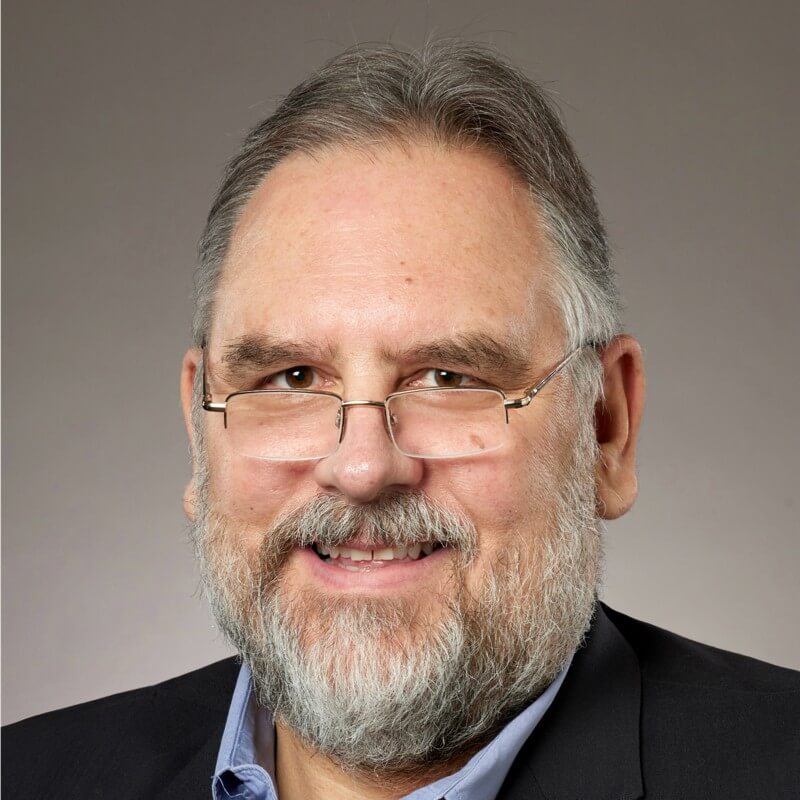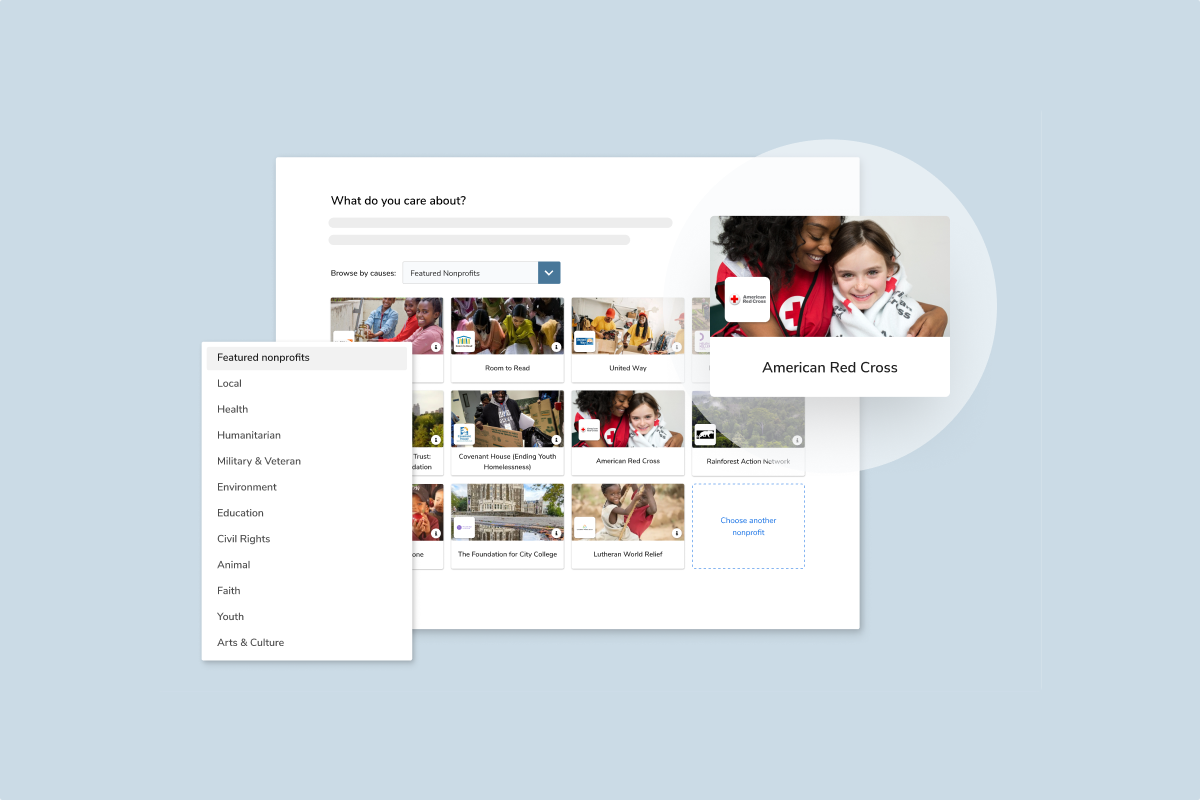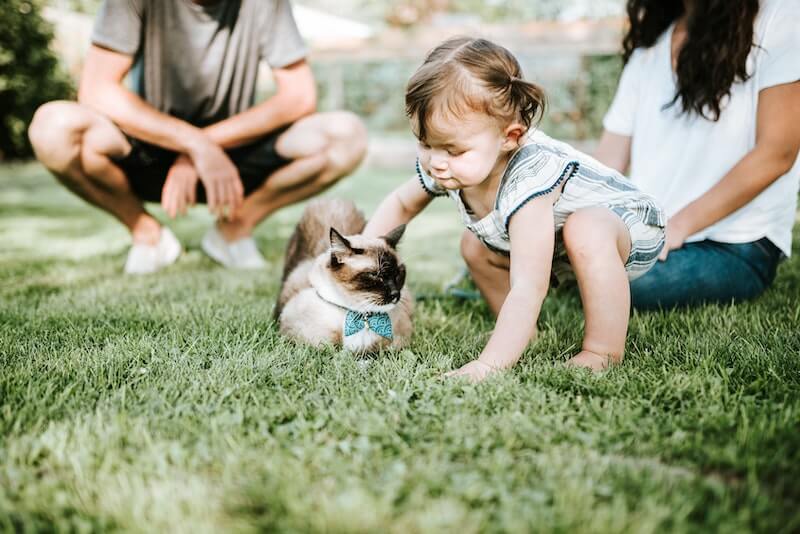In the past three years, over 120,000 Americans have done their estate planning on FreeWill, including their wills, advance directives, and/or financial powers of attorney. They have left $1.25 billion to great causes in their online wills. We are always trying to better understand what services we can provide to make estate planning even more accessible for people. In that spirit, we surveyed 1,000 Americans through PollFish about their estate planning preparedness.
There is still a long way to go in making estate planning accessible for all. Especially in this time of COVID-19, we are reminded that while part of the accessibility gap is financial, another, perhaps larger, part is also emotional: facing mortality is scary. A section of this report explores how the Coronavirus pandemic has impacted people’s thoughts and behaviors towards estate planning.
Only 56% of Baby Boomers have made a will or trust
In the general population, 44% of people have a will, 39% have an advance directive (also known as advance healthcare directives, living wills or healthcare powers of attorney), and 32% have a financial powers of attorney.
Unsurprisingly, those over 55 are much more likely to have completed their estate planning. This confirms what we see on the FreeWill site. Out of our 120,000 users, our median user is 56 year old. That said, only 56% of baby boomers have done their wills, and even fewer have done their advance directives (51%) and financial powers of attorney (39%).
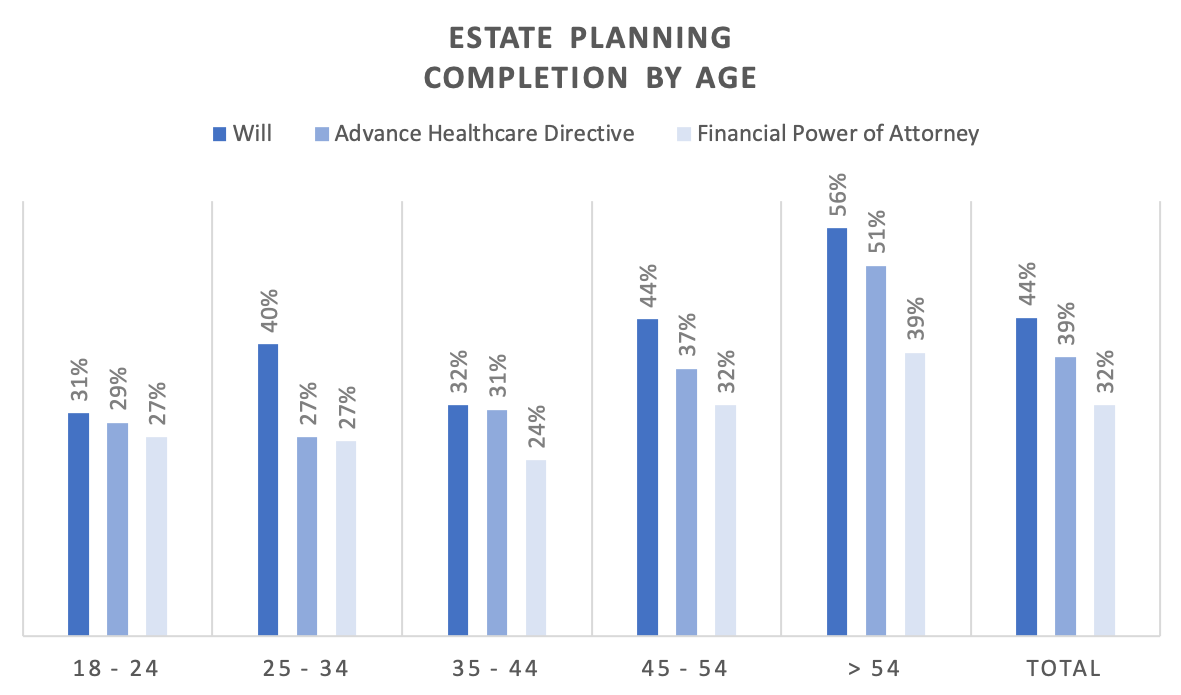
Men have done more estate planning than women
A more surprising finding is that men are more prepared than women. They are more likely to have all three documents (will, advance directive, and financial power of attorney) in place.
That gap is also exacerbated in documents that are related to financials. Men are 34% more likely to have made a will and 39% more likely to have made a financial power of attorney than women. While there is still a preparedness gap with the advance healthcare directive, it is smaller. Men are only 15% more likely to have made an advance healthcare directive.
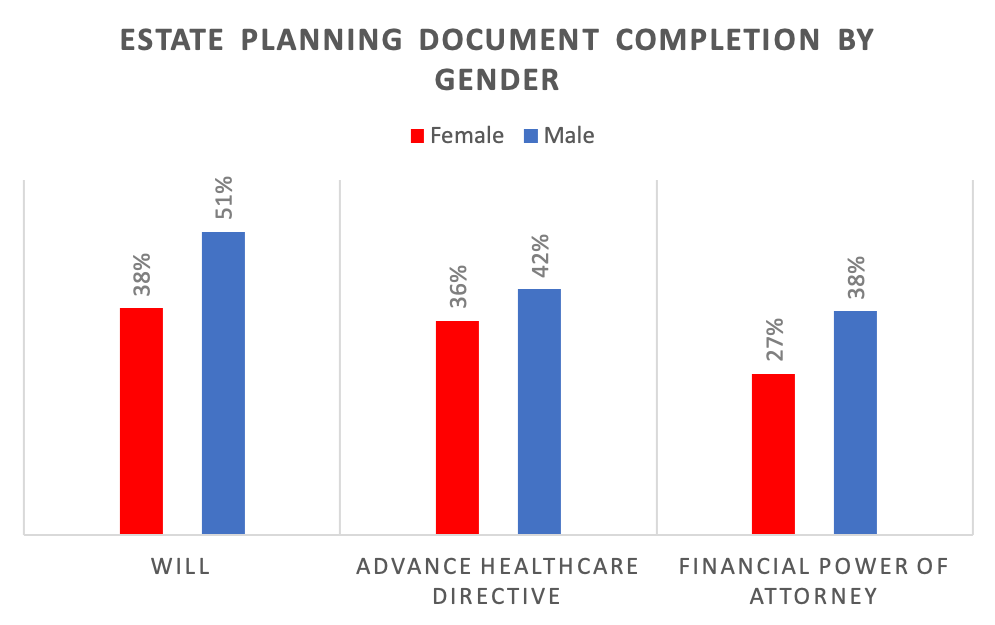
Digital assets are an important and misunderstood part of writing a will
Digital assets include your online accounts or files digitally stored on a computer or server. Examples of digital assets are photos, videos, images, music, email accounts, social media, and other online accounts.
33% of all survey respondents said they knew how to leave their digital assets. Most of those who have learned how to leave their digital assets have made their wills. People who have made their wills are also 2.5x more likely to know how to leave digital assets to beneficiaries (49% of those who had made their wills vs. 21% of those who had not made their wills).
Of the survey respondents who made wills, 46% of them left digital assets. Men were more likely to make provisions for their digital assets (53% vs. 39% of women). In addition, Gen Z and Millennials were more likely to have included digital assets in their wills than Gen X and Baby Boomers.
While younger generations might be more savvy about thinking of their digital assets as assets, people of all generations have high usage of social media, digital photos, and email, and it is likely that nominating a digital executor would be helpful.
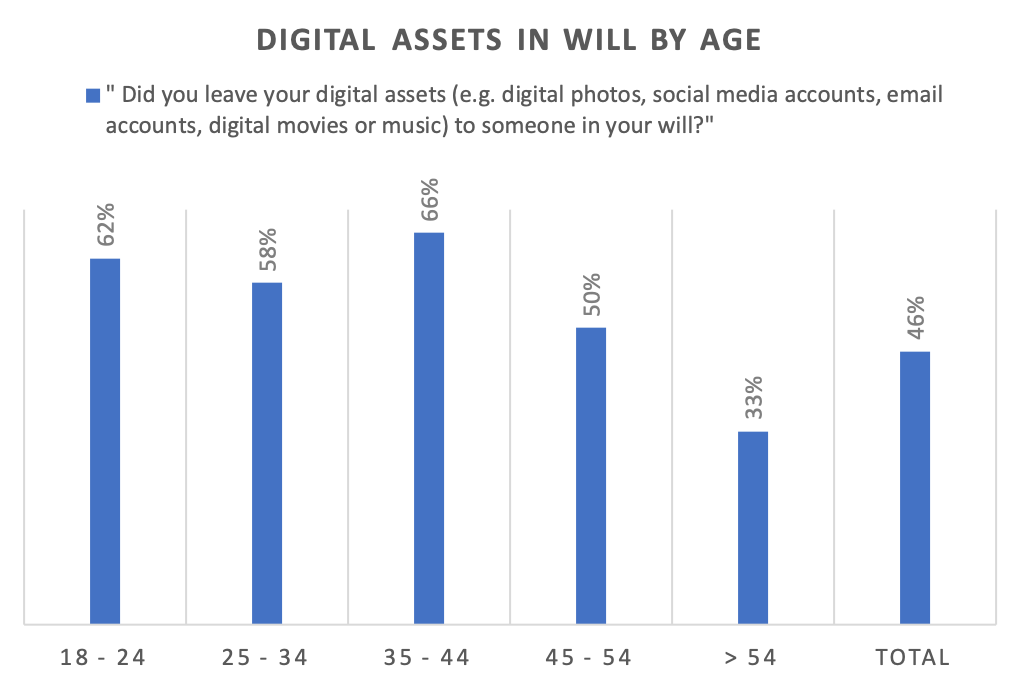
Nearly 2/3 of will-writers under 45 have left digital assets in their wills. This is around double the rate of those over 54.
Americans are excited to leave money to charity, but many haven’t actually done it yet
One in three Americans say they want to leave money to charity in their will, trust, or beneficiary accounts, but only about one in six Americans have done it. This intent vs. action gap is also what we’ve seen on the FreeWill platform. Just by making the charitable option easy and front of mind, we have a 6x donation rate on our platform versus the national average.
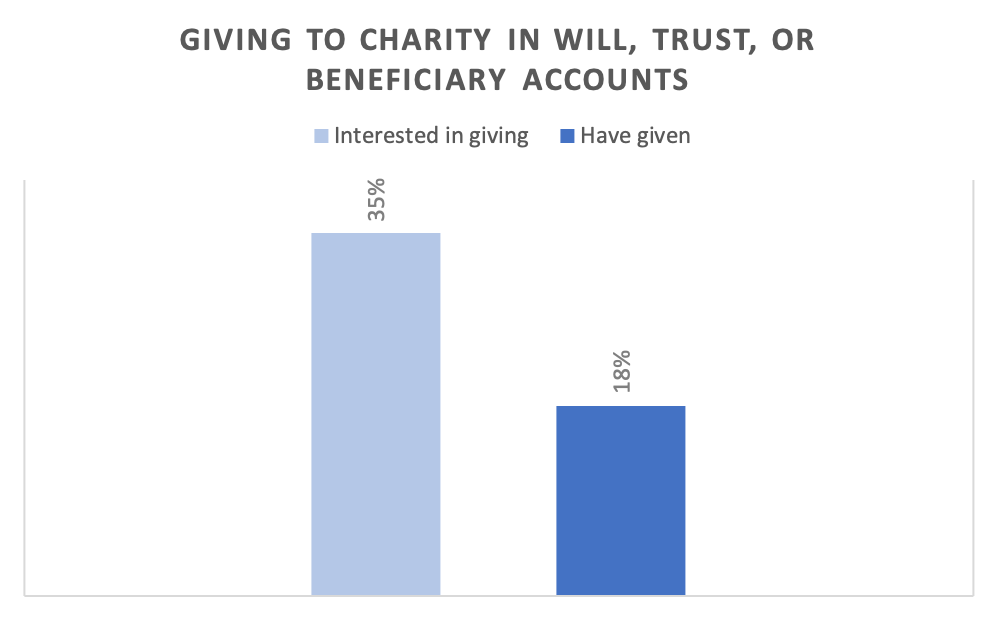
35% of people are interested in leaving money to charity after they pass away, but only 18% have acted on that intent.
Coronavirus has pushed more Americans to make wills
One-third of Americans say that Coronavirus increases the chances they will complete or update their estate plans. For those who did say it increased the chances, common reasons include being nervous about their or their loved ones’ health and well-being and considering mortality for the first time. “Reminder that life is short” was also a common response.
For those who said it would not change their likelihood to do estate planning, the majority of respondents gave reasons similar to surveys and user interviews we have done in normal times: being young and healthy and therefore unconcerned about planning for death, not having much in assets and therefore not knowing why estate planning might be worth it, not being able to afford it, and family already knowing what their wishes are.
A couple of these reasons indicate an education gap. First, estate planning isn’t just about giving away assets. It’s also about protection for dependents like minor children and pets, digital assets, and their healthcare wishes when they are incapacitated. Second, that even if your family knows what you want, it doesn’t mean they can necessarily influence the decision making. Without these documents, the government decides where assets go.
However, for a portion of respondents who said that Coronavirus wouldn’t change their likelihood of doing estate planning, the reasons were either being overwhelmed by the situation (busy caring for sick loved ones, trying to keep a business afloat in a world of social distancing), or unconcerned by it (don’t think they will get Coronavirus because they are healthy or in a location where it is unlikely to impact them).
Finally, although death rates have been much higher amongst older Americans, those over 45 are actually less likely to have the global event change their behavior than those who are younger. This may be an indication that older people have more estate planning in place, but also may be because for younger Americans, this is the first time they have really considered their mortality.
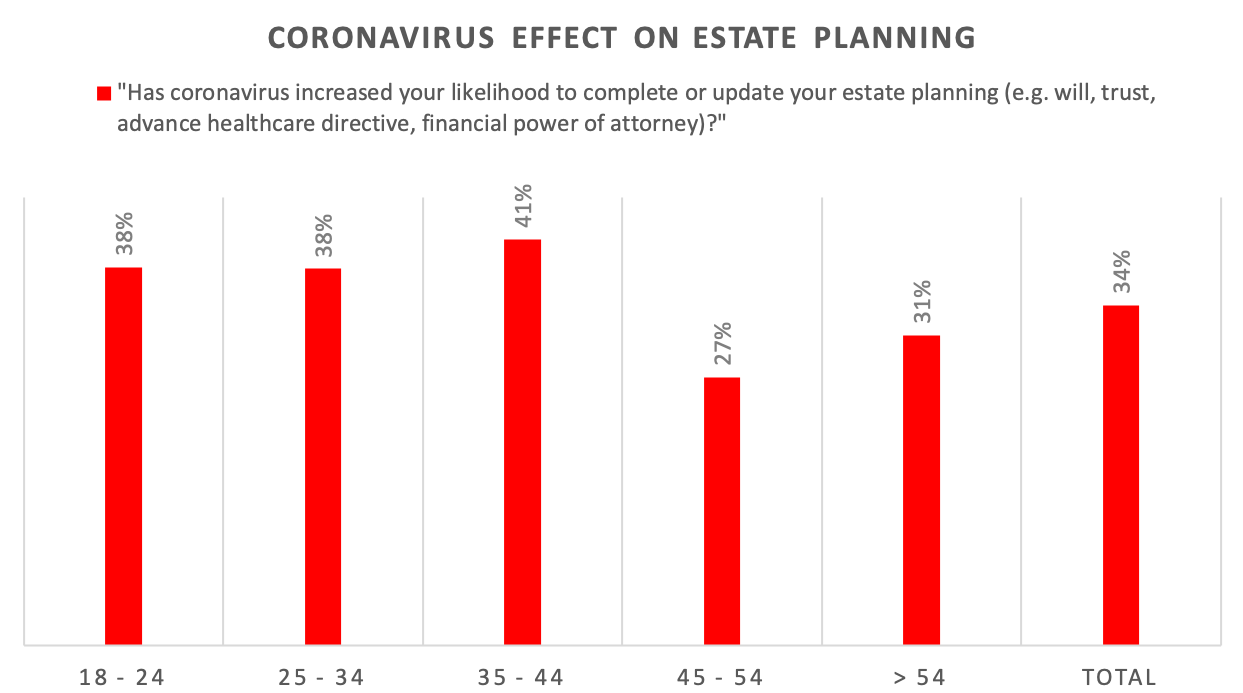
Those over 45 are less likely than those under 45 to change their likelihood to create estate planning based on coronavirus.
Millennials and Gen Z are increasingly turning to online wills and trusts
Of the survey respondents who had made a will or trust, the vast majority have made wills (82%) versus a trust (18%). Of those who have, 63% wrote their will or trust with a lawyer, 17% used an online platform, and 20% wrote it themselves or using self-help aids.
The percent of survey respondents who used a lawyer to draft their documents decreased with age from 75% for those who were over 55 (Baby Boomers), to 64% for 45-54 (Gen X), to around half for 25-44 (Millennials), and just 43% of those 18-24 (Gen Z).

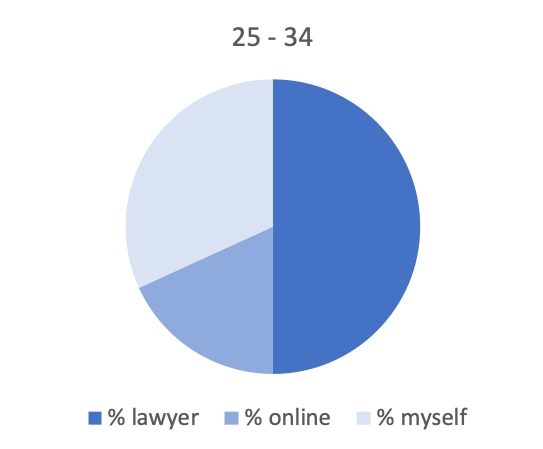
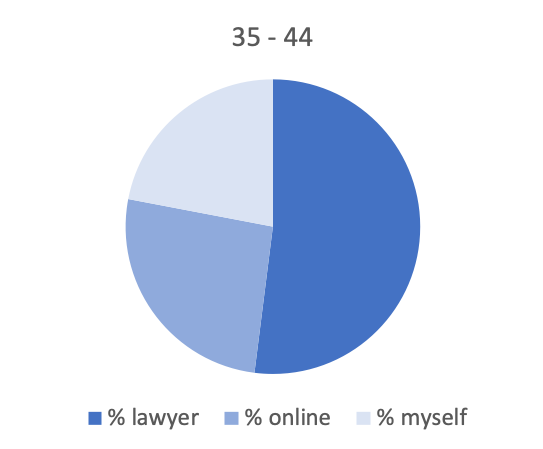
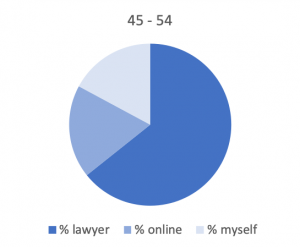
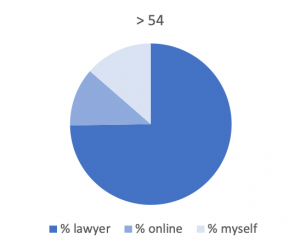
Regardless of age or gender, a very high percentage of people who had completed a will or trust reported involving their family in estate planning during (75%) and / or after (72%) the process.
Not all executors and guardians know they have been nominated in wills
One of the most important decisions involved in creating a will or trust is nominating the trusted people who will carry out your wishes — especially your executor, who is responsible for finding your assets, facilitating the estate through probate court, and distributing your assets, and the guardian of your minor children.
Of those surveyed who had created a will or trust, 75% had told both their guardians and executors that they had been nominated, leaving 25% not as well prepared. 9% hadn’t told either their executor nor their guardian of their nomination, 4% had told their guardian but not their executor, and 12% had told their executor but not their guardian. To put this in perspective, that means that one in five appointed guardians haven’t been told that they might be responsible for a minor child should anything happen to the child’s parents.
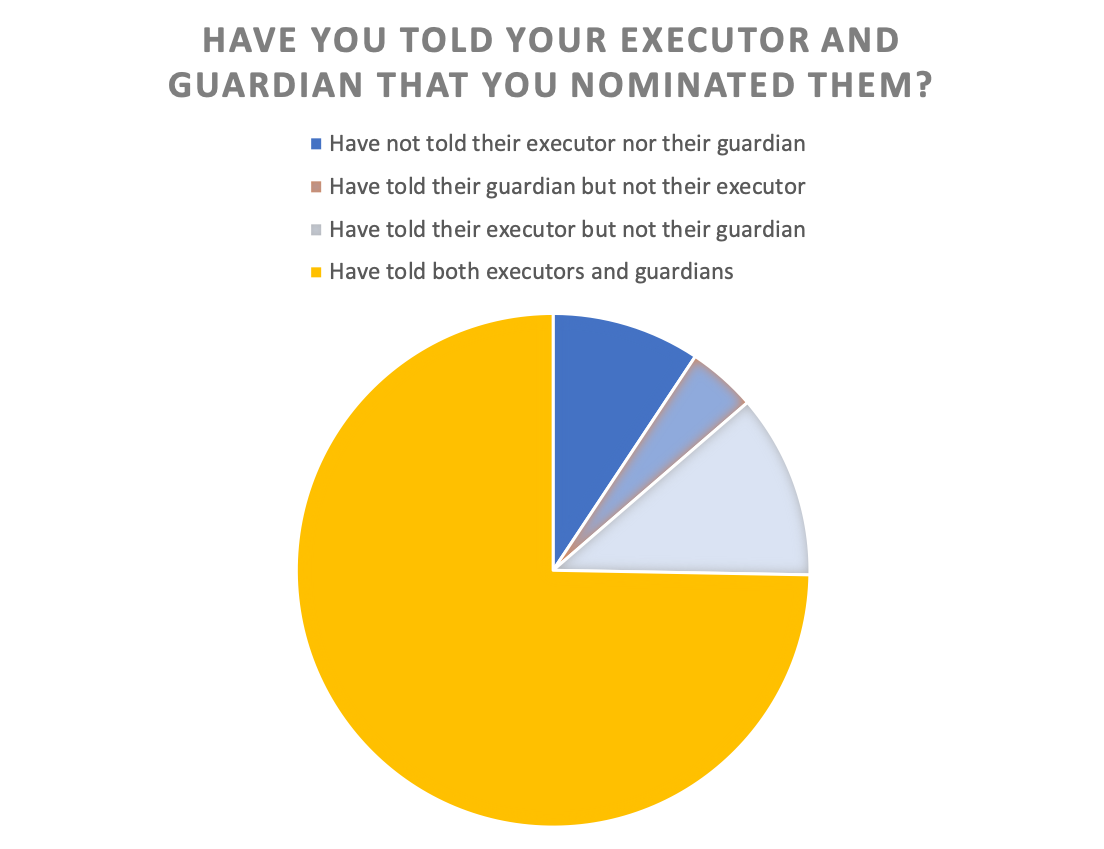
Even recent will-makers have reasons to update their wills
30% of survey respondents who had finished a will or trust had done so within the past year, while another 49% of respondents had completed a will or trust one to five years ago. Five years is around the cadence that many trusts and estates lawyers recommend updating your will.
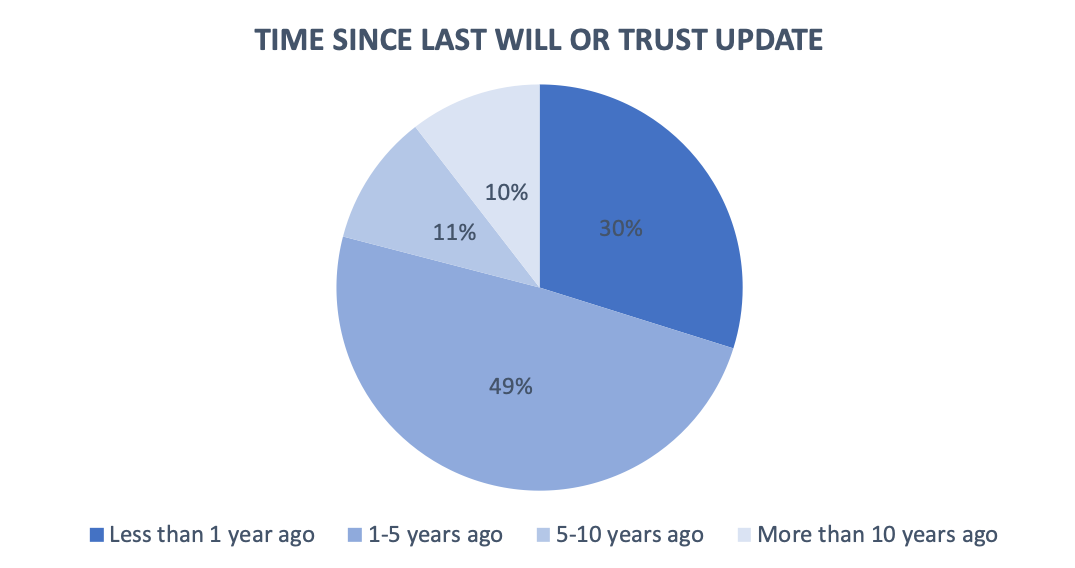
Although most respondents had completed their wills within five years, over half had already had an event occur in their life that might typically trigger updating a will. These events were: getting married, getting divorced, having a child or grandchild born into your family, moving to a new state, getting or losing property (e.g. house, vehicle), and/or one of your beneficiaries, executors, guardians, or witnesses passed away. The most common life event that has occurred since writing a will or trust is having a child or grandchild.
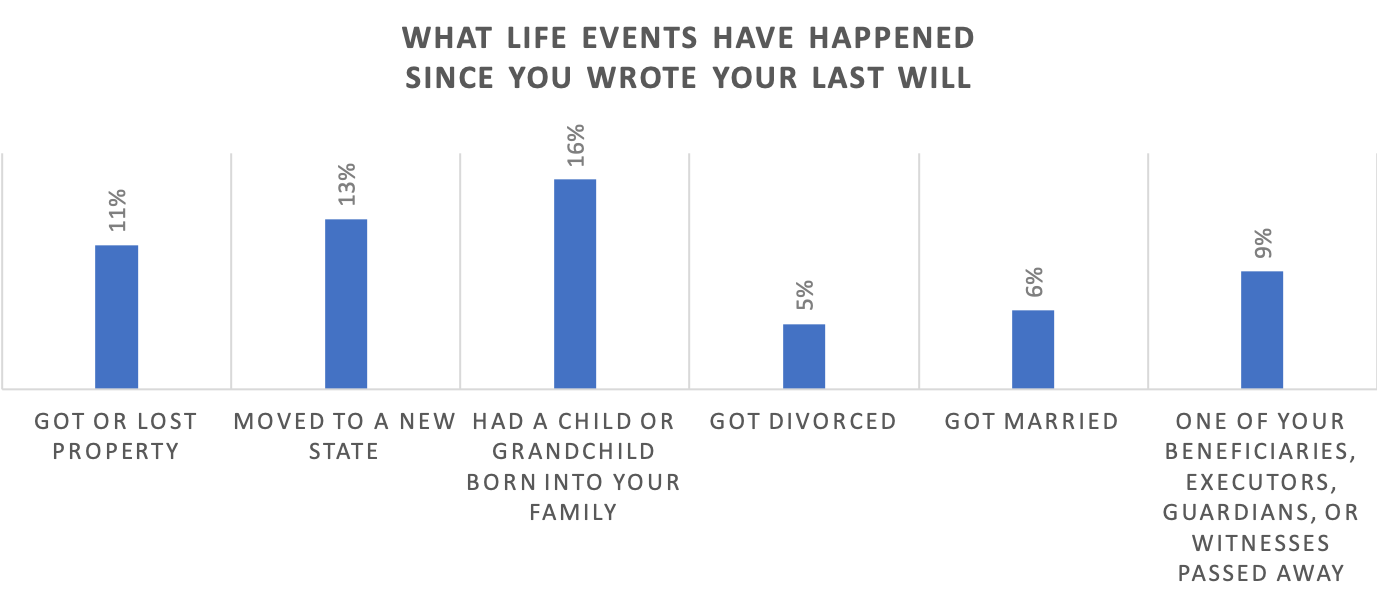
6% of will-writers have gotten married since they last updated their will!
As expected, young people are more likely to have updated their wills or trusts recently.
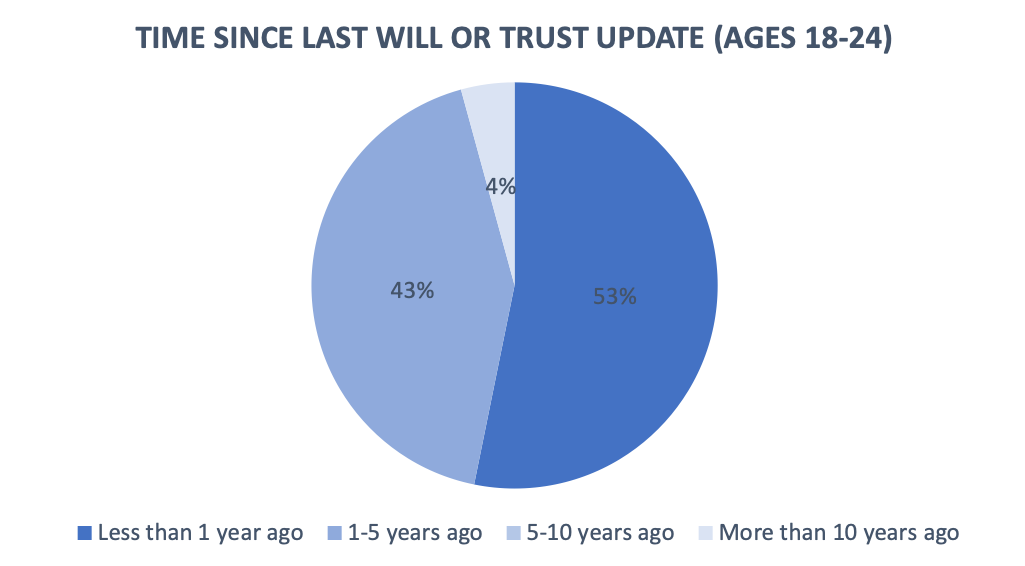
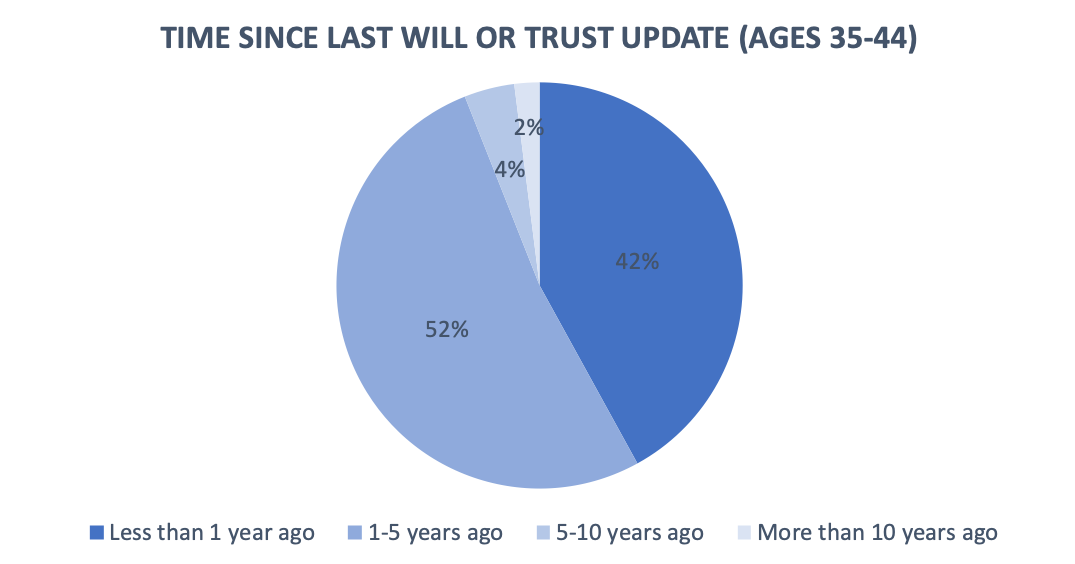
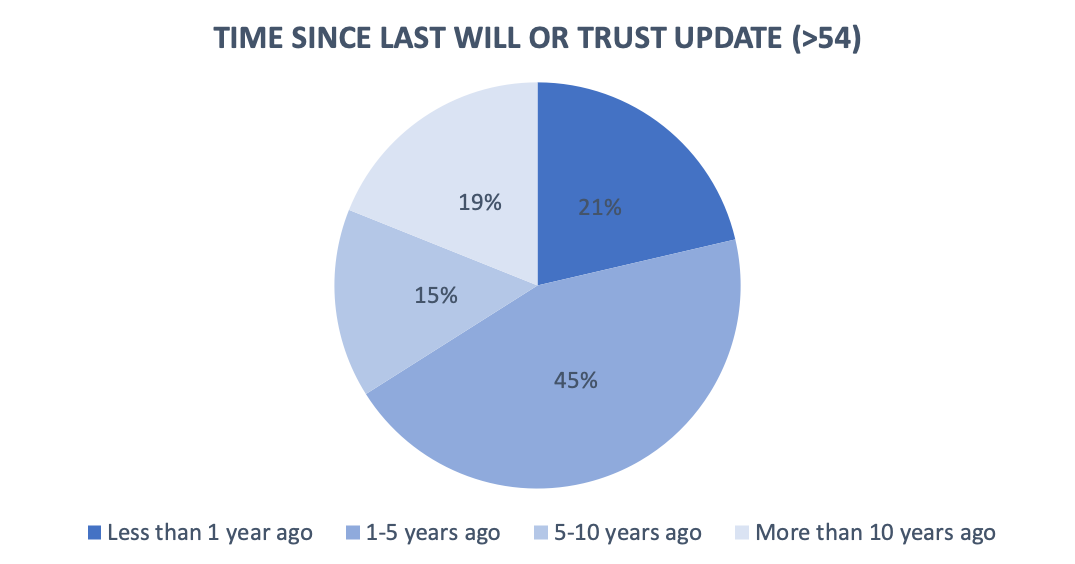
Because more recent will-makers tend to be younger, they also tend to have more life events that would trigger a will update such as getting married, moving to a new state, or having a child.
About FreeWill
FreeWill provides free, warm, and intuitive online estate planning — wills, healthcare directives, and financial powers of attorney. We make it easy for people to leave a legacy by giving to charity in their wills. Our research and software is supported by nearly 300 nonprofit partners who think estate planning should be accessible to everyone.
Make your free estate plan today

Make your free advance healthcare directive

Make your free durable power of attorney

Make a stock donation today

Make your free revocable living trust


